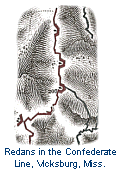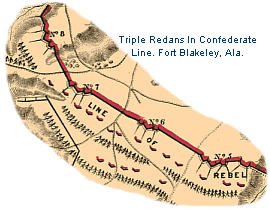A redan was a simple field work consisting of two faces joined
to form a salient angle. This basic trace could be modified in several ways
to produce elements that could project columns of fire across ground in front
of the salient: auxiliary flanks could be added to the extremities of the
faces or the faces could be broken at their mid-points with auxilary flanks
10 to 20 yards long laid out perpendicular to the general line of the faces.
Two or more redans could be joined together to form double or triple redans.
 Redans were employed in situations where a simple
trace and open gorge were required. They could be used to cover small posts
guarding roads or bridges when the avenues of approach were restricted and
the direction of an enemy's approach could be Redans were employed in situations where a simple
trace and open gorge were required. They could be used to cover small posts
guarding roads or bridges when the avenues of approach were restricted and
the direction of an enemy's approach could be
 adequately predicted. Redans were also used in conjunction with
larger works as advanced posts to protect ground that could not be seen from
the larger works; they could also be used to fortify the advanced line in
a line of works with intervals. In many cases redans were employed as strong
points positioned on commanding ground in continuous lines of works where
their faces could project columns of fire across the fronts of less substantial
lines of rifle trenches. adequately predicted. Redans were also used in conjunction with
larger works as advanced posts to protect ground that could not be seen from
the larger works; they could also be used to fortify the advanced line in
a line of works with intervals. In many cases redans were employed as strong
points positioned on commanding ground in continuous lines of works where
their faces could project columns of fire across the fronts of less substantial
lines of rifle trenches. |